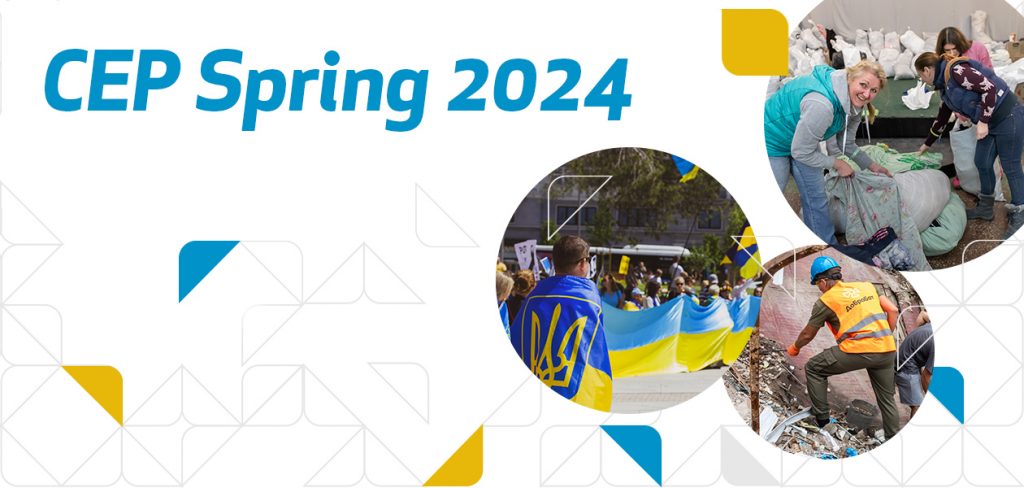The USAID/ENGAGE activity, implemented by Pact, presents the key findings of the spring 2024 Civic Engagement Poll (CEP) commissioned under the project. Conducted for over a decade, CEP is designed to assess Ukrainians’ awareness of and engagement in civil society activities, and their attitudes towards key domestic and foreign policy issues such as corruption, recovery and reconstruction, and EU accession. The survey encompassed two primary groups: adult Ukrainians residing within Ukraine and adult Ukrainians who were externally displaced abroad due to the war (EDPs). For analysis purposes, the sample of citizens residing in Ukraine was disaggregated into internally displaced persons (IDPs) and non-displaced persons (NDPs).
The polling data analysis revealed the following key findings:
- Community Engagement Challenges: Participation in community-based activities has declined significantly since 2022. NDPs saw their engagement drop from 63% to 47%, IDPs from 36% to 23%, and EDPs from 36% to 26%. Additionally, when asked if they are engaged in the life of their community only 47% of NDPs, 23% of IDPs, and 26% of EDPs responded affirmatively. This data reflects varying levels of community engagement, with non-displaced Ukrainians showing the highest levels of engagement, while internally and externally displaced populations show significantly lower engagement levels.
- Decline in CSO Participation: Since 2022, participation in formal CSOs has steadily declined. Currently, only 27% of NDPs are engaged with CSOs, with participation dropping to a low of 15% among IDPs over the past year. Additionally, the perceived usefulness of CSO activities in addressing key social issues has decreased nearly four-fold compared to the previous year.
- Gender Differences in Civic Engagement: Gender analysis reveals distinct patterns in civic engagement and trust. Non-displaced Ukrainian men are more active in engaging in CSO and community-based activities, while the engagement of IDP women was significantly higher than that of men. Men were more active in donating to the army, protesting corruption, and participating in recovery and reconstruction efforts, while women were more involved in supporting non-war-related charitable activities and prioritize donations for the rehabilitation and reintegration of war veterans, IDPs, and other vulnerable groups. Women also tend to be slightly more skeptical about the trustworthiness, effectiveness, and transparency of CSOs compared to men.
- Informal Civic Activism Offers Hope: More citizens are engaged in informal civic initiatives compared to community-based or CSO led activities. Among NDPs, 49% participated in informal citizen-led initiatives, compared to 47% who engaged in community life and 27% who joined the work of CSOs. For IDPs, 40% took part in informal initiatives, whereas 23% were involved in community life, and 15% engaged in CSO-led activities. Among EDPs, 43% participated in informal initiatives, 26% were involved in community life, and 27% participated in CSO activities. Similarly, while most Ukrainians across all samples indicate a high level of trust in CSOs, greater trust in informal civic initiatives is expressed by 53% of NDPs, 61% of IDPs and 39% of EDPs. The perceived usefulness of informal initiatives for key social issues is higher than that of formal CSOs.
- Increasing Corruption Encounters: The number of Ukrainians encountering corruption has more than doubled since last year, surpassing the historical maximum recorded in 2017. Despite most believing bribery is never justified, 25% of in-country respondents reported direct experiences with bribery, extortion, and other corrupt practices over the past year.
- Democratic Governance as a Post-War Priority: More than half (56%) of NDPs and 66% of EDPs believe the state should prioritize democratic governance issues, primarily focusing on eliminating corruption. For families, the main concerns are socio-economic issues, housing, infrastructure, and health. Democratic governance is perceived to have lower immediate post-war priority for families.
- Recovery and Reconstruction Responsibility: A vast majority do not believe now is the right time to start Ukraine’s recovery and reconstruction. While most see national and local governments as primarily responsible, nearly one-third believe average citizens and CSOs share this duty. Key areas for citizen contribution include the reconstruction of housing and infrastructure, and the rehabilitation and reintegration of war victims.
- Preconditions for EU Membership: Awareness of preconditions for Ukraine’s EU membership negotiations is sharply split, with half of the respondents aware and the other half not. Nearly 80% believe they cannot influence the accession process.
- Displacement and Community Belonging: Both present a major challenge for social cohesion and integration. While half of Ukrainians in the country feel a strong sense of community belonging, 54% of IDPs and 50% of EDPs feel less integrated and exhibit higher levels of distrust. 21% of non-displaced respondents feel disconnected, compared to significantly higher numbers among displaced populations.
